The pictures you see throughout this post are of dead oak trees along the Mississippi Gulf Coast, turned into sculptures after their destruction. A hurricane wiped out our coastline two years ago today. It's reach was far and wide. It's winds destroyed homes miles inland. It's tornadoes destroyed neighborhoods miles inland. Hours inland. It's winds picked up the Gulf of Mexico and forced it into our homes. Miles inland. The Gulf of Mexico's waters found their way through our bayous, bays, and waterways. Miles inland.
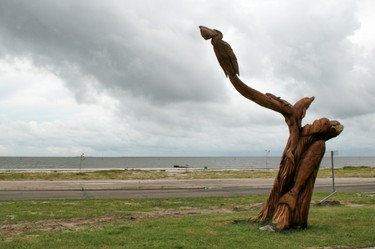
It wasn't just the fools on the beach like me that lost everything.
Bodies of the victims are still being found today. Did you know that?
We lost our home. We returned from evacuation to find a bare slab of concrete. But we aren't victims. We refuse to be victimized.
Yet we still mourn. We mourn it all.
Unlike a house fire that destroys your home, unlike the attacks on 9/11 that killed so many and destroyed the livelihood of even more, the effects of Hurricane Katrina stretched for miles. For hours worth of miles. We lost our homes, our jobs, our cars, our churches, our schools, our hospitals, our libraries, our public transportation, our grocery stores, our parks, our roads and bridges connecting our communities, our government buildings, our museums, our historical landmarks... we lost so much that we called home. There was nowhere to go to escape the destruction. Everywhere you went, you were reminded of what was lost. There was no escape.
Two years later, the depression and suicide rates are on the rise. Did you know that?
Drive down the beach today and you still find mostly... nothing.
Bare slabs of concrete. Half demolished plantation homes. Hollowed out stores. Hollowed out churches. Fields of FEMA trailers full of sick families, choking on formaldehyde fumes, forced to remain because there is no affordable housing and they are still paying a mortgage on a slab of concrete.
People ask me all the time, "So, is everything getting back to normal down there?" Simply, yes. Simply, no. We are working on rebuilding, but not the lives that we once shared. We are rebuilding a very different Gulf Coast. I think it will be for the better. I think we will find a multitude of blessings, if we just open our hearts and our minds to recognize them.
I'm holding one in my arms right now. Had I been home and organized, I never would have had Goose. Yep, I have a hurricane baby.
The Mississippi Gulf Coast will be better than ever. Give it five years and see. It will be amazing. So much is already changing. So many fabulous things are coming in, moving in, being built. It will be beautiful. It will be new. It will be charming and inviting.
And there will be nothing stopping it from being wiped out all over again.
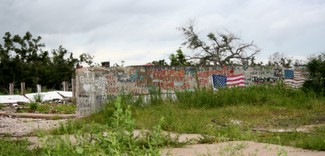
There will be nothing stopping a massive wall of water and mile wide winds that last for hours from just wiping it clean off the map. Again.
You decide to take a risk. We decided to take a risk by moving to the beach. We had just moved from New Orleans a couple of months before and thought a beach home would be fun while we decided where to lay our roots. And it was fun. For a minute.
We will probably never return to the beach. Nowhere near waters that can rise up and claim our home. We will not risk it again. It's too difficult, no matter how beautiful.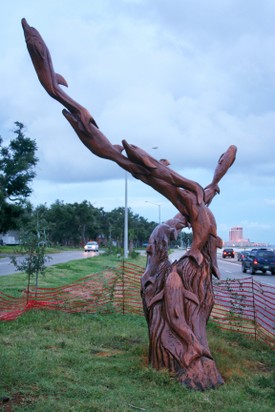
In case you were wondering, we did have insurance. In fact, we had "hurricane insurance." Unfortunately, I failed to realize that so-called hurricane insurance doesn't pay squat if, say, it rains during the hurricane. All your stuff blown up into a tree? "Well, it's wet, too, so we can't figure out what did the damage, ma'am. Sorry. No money for you." Or, in our case, "Hey, where is your stuff? All we see is a slab of concrete. How are we supposed to know if you had any wind? No money for you. Now scram! And stop calling us."
By the way, hurricanes are defined by their wind velocity. It was called Hurricane Katrina. Not Rainy Flood Katrina. But whatever. Oh, and yeah, that's some of our stuff up in that tree above the water line. Guess some of those trained dolphins from the oceanarium must have kicked it up there with their flukes when they were washed into the Gulf. No way we had wind.
But I digress.
We choose to remain here on the Gulf Coast. Living anywhere near a coastline is a risk. Yes, even those hotsy totsy New York City dwellers. Nothing keeping them from being wiped out by Hurricane Vinnie. And, no, there is nothing keeping Hurricane Boudreaux from wiping out New Orleans again, regardless of how high they build their levees. No matter what they do to change their government. No matter how many times Brad Pitt smiles in the 9th Ward.
But I bet you've heard enough about New Orleans today.
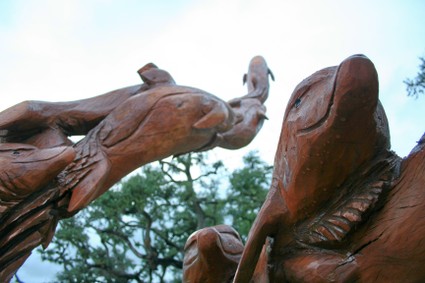
So, if you would, do me a favor. When anyone talks to you today about New Orleans, remind them that we are still here in Mississippi. In fact, there are still some crazy folk over in Alabama along the coastline, too. A hurricane wiped us out two years ago today and we are still here. It wasn't our local government's fault, we don't have a crazy mayor to point fingers at, so it's not as interesting to talk about for the media, but it still happened. A mighty wind done blew us down. Took us out to sea. Left us with nothing...
Except our manners. Our pride. Our determination. Our anger. Our spirit. Our sadness. Our charity. Our gratefulness. Our elbow grease. And, yes, our hope.
So we make do with what we have. We turn the dead forms of majestic oaks along the beach into beautiful sculptures and we do it with chainsaws. Testaments to our determination and faith and hope. Testaments to our ferocity and livid persistence. We spit in the placid blue eye of Mother Nature. We dare her to rear her powerful head again. We take chainsaws to the scraps she leaves us with and we tell her to bring it on. We're not leaving. We'll take the risk and we'll rebuild again if we have to, and we'll do it ourselves.
In Mississippi, we pull ourselves up by our bootstraps and we forge ahead. Let 'em talk about New Orleans and their politics all day long. We have work to do over here. Stop your jabbering and pick up a shovel and a hammer. It will be a long day, but it will feel good to sweat it out. When we're done, the crawfish and beer are on me.
Pinch the tail and suck out the head. There's a hurricane party every time it blows!
* * * * * * * * *
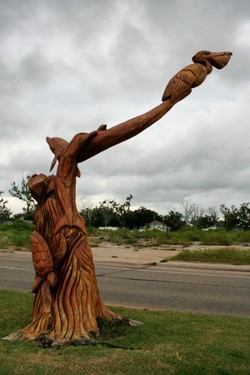 All governmental assistance politics aside, it is important for me to mention that the American Red Cross was an incredible help after Hurricane Katrina. They drove around our neighborhoods providing hot meals to workers, volunteers, and weary young families that just didn't feel like eating another sandwich in the dark. Seeing the Red Cross truck drive down our road was always a welcome sight.
All governmental assistance politics aside, it is important for me to mention that the American Red Cross was an incredible help after Hurricane Katrina. They drove around our neighborhoods providing hot meals to workers, volunteers, and weary young families that just didn't feel like eating another sandwich in the dark. Seeing the Red Cross truck drive down our road was always a welcome sight.
We put aside our pride and accepted help from the Red Cross in the days after Katrina and now make it a priority to begin paying them back. If you are looking for a solid organization to which you can donate, I highly recommend the American Red Cross. I saw first-hand how they use the funds we donate and it was astonishingly refreshing.
They didn't fix everything; they made it easier for us to survive while we fixed it ourselves.
Want to do more yourself? Want to come visit me down here? Check out the relief organization Hands On Gulf Coast.
*By the way, "Camille was a Lady" is a reference to Hurricane Camille in 1969. The worst hurricane to destroy the Gulf Coast, before Hurricane Katrina. While a more powerful storm than Katrina, it's duration was shorter and it's reach was not nearly as wide. The size and duration of Katrina is what made her the worst natural disaster in the history of the United States. Camille slipped in, tore up the place, and slipped out. Katrina stuck around awhile, called us names and insulted our mammas.

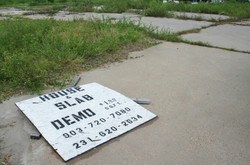








 Writer. Mother.
Writer. Mother.
